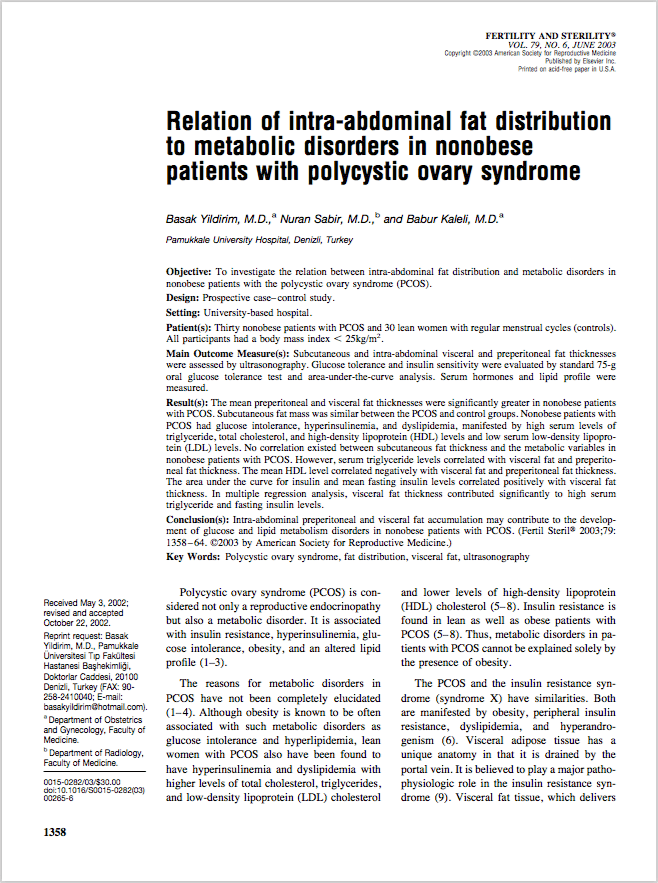Relation of intra-abdominal fat distribution to metabolic disorders in nonobese patients with polycystic ovary syndrome
Fertil Steril. 2003 Jun;79(6):1358-64.
Yildirim B, Sabir N, Kaleli B.
Abstract
Objective: To investigate the relation between intra-abdominal fat distribution and metabolic disorders in nonobese patients with the polycystic ovary syndrome (PCOS).
Design: Prospective case–control study.
Setting: University-based hospital.
Patient(s): Thirty nonobese patients with PCOS and 30 lean women with regular menstrual cycles (controls). All participants had a body mass index < 25kg/m2.
Main outcome measure(s): Subcutaneous and intra-abdominal visceral and preperitoneal fat thicknesses were assessed by ultrasonography. Glucose tolerance and insulin sensitivity were evaluated by standard 75-g oral glucose tolerance test and area-under-the-curve analysis. Serum hormones and lipid profile were measured.
Result(s): The mean preperitoneal and visceral fat thicknesses were significantly greater in nonobese patients with PCOS. Subcutaneous fat mass was similar between the PCOS and control groups. Nonobese patients with PCOS had glucose intolerance, hyperinsulinemia, and dyslipidemia, manifested by high serum levels of triglyceride, total cholesterol, and high-density lipoprotein (HDL) levels and low serum low-density lipoprotein (LDL) levels. No correlation existed between subcutaneous fat thickness and the metabolic variables in nonobese patients with PCOS. However, serum triglyceride levels correlated with visceral fat and preperitoneal fat thickness. The mean HDL level correlated negatively with visceral fat and preperitoneal fat thickness. The area under the curve for insulin and mean fasting insulin levels correlated positively with visceral fat thickness. In multiple regression analysis, visceral fat thickness contributed significantly to high serum triglyceride and fasting insulin levels.
Conclusion(s): Intra-abdominal preperitoneal and visceral fat accumulation may contribute to the development of glucose and lipid metabolism disorders in nonobese patients with PCOS.
Abstract Source: https://www.ncbi.nlm.nih.gov/pubmed/12798883
Relation of intra-abdominal fat distribution to metabolic disorders in nonobese patients with polycystic ovary syndrome.
Yildirim B, Sabir N, Kaleli B.
Fertil Steril. 2003 Jun;79(6):1358-64.
PMID: 12798883

